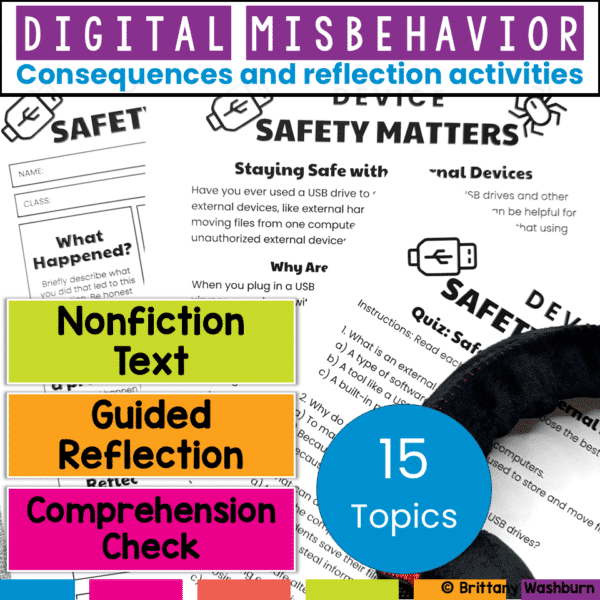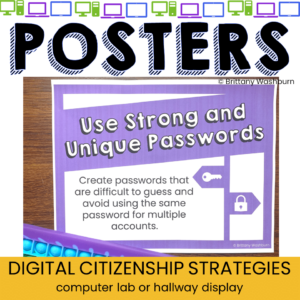Activities and Reflections for Common Computer Misbehavior
Encouraging Accountability: Consequence Activities and Reflections for Common Computer Misbehavior in the Classroom
Managing technology use in the classroom can sometimes be a challenge, especially when students veer off task or mishandle devices. As educators, it’s crucial to implement consequences that not only correct behavior but also promote accountability and reflection, helping students understand the impact of their actions while maintaining their dignity.
Why Use These Consequences Instead of Simply Taking the Device Away?
It might seem tempting to simply take a device away when students misuse technology, but this approach misses a key opportunity to teach valuable lessons about responsibility, digital citizenship, and accountability. Here’s why teachers may choose to assign these reflective and educational consequences instead:
1. Teaches Accountability
When students engage in activities that misuse technology, simply taking the device away sends a message that the device is the problem, not the behavior. By assigning a consequence tied to their specific misbehavior, students are held accountable for their actions and learn that they are responsible for how they use technology.
2. Promotes Critical Thinking
Consequences that involve research, reflection, and creative tasks encourage students to think critically about their actions. Whether it’s exploring the dangers of unauthorized downloads or the importance of following online etiquette, these tasks help students understand the why behind the rules, rather than just enforcing compliance.
3. Fosters Long-Term Digital Citizenship Skills
In today’s digital world, students need to develop good habits when using technology, not just in school but also in their personal lives. These consequences are designed to reinforce skills like online safety, digital etiquette, and respecting shared resources. Taking a device away only stops the immediate issue, but it doesn’t provide students with the skills they need to prevent similar issues in the future.
4. Maintains Student Dignity
By offering a reflective activity instead of a punishment, teachers maintain student dignity. Publicly taking away a device can be embarrassing and may not lead to genuine behavior change. In contrast, giving students a chance to reflect privately or in a more thoughtful way helps them understand their mistakes without damaging their self-esteem or confidence.
5. Encourages Positive Behavior Change
Reflection activities allow students to take ownership of their behavior and think about how they can improve. For example, asking a student who played games during class to log their on-task time and reflect on how to stay focused helps them build self-regulation skills. This proactive approach leads to lasting behavior changes rather than temporary compliance out of fear of losing their device.
6. Connects Technology Use to Learning
Ultimately, the goal of technology in the classroom is to enhance learning. By assigning consequence activities that are educational—such as researching digital safety or creating a time-management plan—teachers reinforce the idea that technology is a tool for learning. Taking the device away, however, separates students from the tool they need to succeed in today’s digital learning environments.

By implementing thoughtful consequences tied to specific misbehaviors, teachers empower students to learn from their mistakes, grow as responsible digital citizens, and develop skills that go beyond the classroom. Rather than just removing technology, this approach helps students understand the privilege and responsibility that comes with using it effectively.
Here’s a comprehensive list of consequence activities and reflection opportunities for common computer misbehavior, tailored to guide elementary students toward responsible tech use.
1. Inappropriate Website Access
- Consequence Activity: Have students complete a short research assignment on digital citizenship, focusing on the importance of appropriate internet use in educational settings.
- Reflection Opportunity: Ask students to write about why certain websites are restricted in the classroom and how staying focused on educational content benefits their learning.
2. Mishandling Technology Equipment
- Consequence Activity: Show a short video or tutorial on proper equipment care, followed by a quiz on how to handle devices safely.
- Reflection Opportunity: Have students reflect on the importance of taking care of technology and how mishandling equipment could impact the entire class.
3. Unauthorized Downloads or Installing Software
- Consequence Activity: Students research the dangers of downloading unauthorized software, such as viruses or malware, and create a poster or presentation explaining the risks.
- Reflection Opportunity: Ask students to write a paragraph explaining why it’s essential to follow school download policies and what could happen to school computers if they don’t.
4. Playing Games During Class Time
- Consequence Activity: Have students complete a time-management worksheet, logging their on-task and off-task activities. Follow up with a short lesson on how staying focused helps them finish their work efficiently.
- Reflection Opportunity: Students reflect on how off-task behavior affects their ability to complete assignments and how they can improve focus in future classes.
5. Tampering with Another Student’s Work
- Consequence Activity: Assign a digital collaboration etiquette activity where students review guidelines on respecting others’ work in a shared digital space.
- Reflection Opportunity: Have the student write an apology to the affected peer and reflect on the importance of respecting others’ contributions during collaborative work.
6. Using Personal Social Media or Messaging During Class
- Consequence Activity: Students complete an activity on responsible social media use and digital privacy, such as reading an article on digital footprints and creating a safe social media use plan.
- Reflection Opportunity: Have students reflect on how using social media during class distracts from learning and how privacy online is tied to responsible use.
7. Sharing Passwords or Ignoring Security Protocols
- Consequence Activity: Ask students to create a secure password plan, including writing down hypothetical strong passwords. They should also review why keeping passwords secure is important.
- Reflection Opportunity: Students reflect on the importance of digital security and how sharing passwords can compromise both personal and school information.
8. Disrespectful Online Communication
- Consequence Activity: Assign a digital etiquette lesson, either through reading or watching a video. Follow it with an activity where students rewrite an inappropriate message using respectful language.
- Reflection Opportunity: Have students reflect on how online words impact others and how respectful communication fosters a positive learning environment.
9. Not Logging Out or Leaving Computers Unattended
- Consequence Activity: Have students create a digital safety checklist for computer lab usage, emphasizing the importance of logging out and securing devices.
- Reflection Opportunity: Students reflect on why leaving devices unattended or not logging out can pose security risks for themselves and others.
10. Failing to Follow Directions During Group Work
- Consequence Activity: Have students complete a teamwork skills activity, reviewing why it’s essential to follow directions and contribute positively to group tasks.
- Reflection Opportunity: Students reflect on how following directions and being a cooperative team member impacts the success of a project and the experience of their peers.
11. Disrupting the Class with Excessive Talking or Off-Task Behavior
- Consequence Activity: Assign a focused attention activity or a mindfulness exercise that teaches self-regulation, such as watching a short video on the importance of focus during class.
- Reflection Opportunity: Students reflect on how staying on task contributes to a positive learning environment and how disruptions affect both their learning and that of their classmates.
12. Deleting or Altering Shared Files
- Consequence Activity: Have students review the school’s policy on shared file use and complete a digital responsibility quiz.
- Reflection Opportunity: Students reflect on the importance of respecting shared resources and how tampering with shared files can disrupt group productivity.
13. Unauthorized Use of External Devices (e.g., USB Drives)
- Consequence Activity: Students research the potential risks of using unauthorized external devices, such as spreading viruses, and create a brief presentation on safe usage.
- Reflection Opportunity: Students reflect on why following the school’s policy on external devices is crucial and how breaking these rules could impact the school’s digital infrastructure.
14. Using Computers for Non-Educational Purposes (e.g., Watching Videos)
- Consequence Activity: Assign a worksheet distinguishing educational from recreational computer use, having students identify examples of each.
- Reflection Opportunity: Have students reflect on how they can prioritize educational tasks in the classroom and save recreational activities for appropriate times.
15. Failure to Save Work Properly
- Consequence Activity: Have students complete a lesson on saving and backing up work, followed by creating a step-by-step guide for organizing files efficiently.
- Reflection Opportunity: Students reflect on how failing to save work properly can hinder their progress and what steps they can take to ensure their work is always secure.
These activities not only address the specific misbehavior but also encourage students to reflect on their actions, promoting self-awareness and responsibility. By linking consequences to learning opportunities, we can help students develop a deeper understanding of their role in maintaining a positive and productive classroom environment.
Consider these activities to teach and review digital citizenship:














